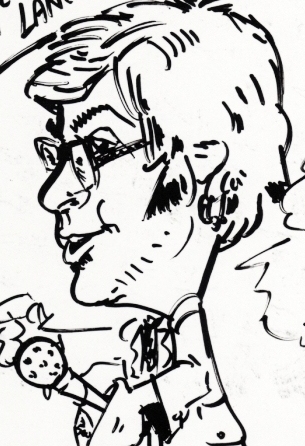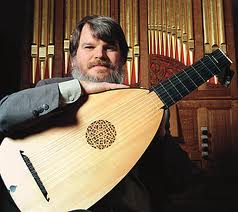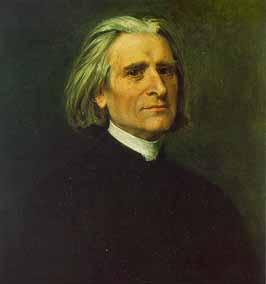Welcome to our free classical music site

Do you write about classical music? Are you a blogger? Want to team up with Classical Connect? Send us a message, let's talk!

Do you write about classical music? Are you a blogger? Want to team up with Classical Connect? Send us a message, let's talk!
November 14, 2011
Anniversary odds and ends. Here are several recent and upcoming birthday anniversaries, which we’d like to note. Niccolò Paganini was born on October 27, 1782. His anniversary comes just five days after that of Franz Liszt’s, who was so impressed by Paganini’s virtuoso playing that it changed his own performing career. Here’s Paganini’s La Campanella, from the third movement of his Second violin concerto; Liszt later used it in one of his “Grandes études de Paganini.” It’s arranged for viola and performed by the Russian-Italian violist Anna Serova, with Jenny Borgatti on the piano.
Vincenzo Bellini, who was born on November 3, 1801 is of course known for his great bel canto operas, Norma, I puritani, La sonnambula. Maybe one day we’ll have them online, but for now we’ll have to be content with an arietta. Vaga luna, che inargenti (Beautiful moon, dappling with silver) is sung by the soprano Leah Partridge, Anne Breeden is on the piano.
The great French baroque composer François Couperin was born on November 10 in 1668. Here’s his Air de Diable, from the so-called New concerts written in 1724. It’s performed by Amit Peled, with Eliza Ching on the piano.
And this week marks anniversaries of two composers of the 20th century. Aaron Copland was born on November 14, 1900; Paul Hindemith was born five years earlier, on November 16 of 1895. We’ll hear two pieces for the flute. First is Duo for Flute and Piano by Copland, composed in 1971 (it’s played by Martha Councell, flute and Richard Steinbach, piano – listen to it here). As so much of late Copland’s work, it’s lyrical, “American” and deceptively simple. Hindemith’s Sonata for Flute and Piano is very different. Written in 1936, it’s neo-classical in style and, though lighter than many of Hindemith’s pieces, is still full of tension, especially in the second and third movements. The sonata is played here by Jennifer Bartel, flute and Melody Lord, piano.
And finally, Carl Maria von Weber, the “first Romantic,” was born on November 18, 1786. His ever-popular Invitation to the Dance is played by the pianist Lara Downes (to listen, click here).
November 7, 2011. Boyce Lancaster interviews Paul O'Dette. Paul O’Dette is a Grammy-nominated American lutenist, conductor, and overall specialist in early music. He plays the lute, the Baroque guitar and mandolin, the theorbo and other Renaissance and Baroque instruments. Here he plays a Baroque guitar; the piece, Fandango, is by Santiago de Murcia (1673 – 1739), a Spanish composer and guitarist. The wonderful Toccata Arpeggiata (here) is by the German-Italian Johann Hieronymus (Giovanni) Kapsberger (1580 –1651); it’s played on the theorbo, a long-necked lute. You can hear that it’s a much more powerful instrument than the baroque guitar. And here O’Dette plays a lute. The piece is Piva, by the early 16th century Italian lutenist and composer Joan Ambrosio Dalza (all three pieces are courtesy of YouTube). The complete interview is here, and below is Boyce’s introduction to his conversation with Paul O’Dette.
He plays the lute, the Baroque guitar and mandolin, the theorbo and other Renaissance and Baroque instruments. Here he plays a Baroque guitar; the piece, Fandango, is by Santiago de Murcia (1673 – 1739), a Spanish composer and guitarist. The wonderful Toccata Arpeggiata (here) is by the German-Italian Johann Hieronymus (Giovanni) Kapsberger (1580 –1651); it’s played on the theorbo, a long-necked lute. You can hear that it’s a much more powerful instrument than the baroque guitar. And here O’Dette plays a lute. The piece is Piva, by the early 16th century Italian lutenist and composer Joan Ambrosio Dalza (all three pieces are courtesy of YouTube). The complete interview is here, and below is Boyce’s introduction to his conversation with Paul O’Dette.
The Masterful Talent of Paul O’Dette.
The Toronto Globe and Mail described Paul O’Dette as the clearest case of genius ever to touch his instrument. No one I have spoken with regarding Paul and his playing has ever disputed that, but they are usually surprised when I mention that his acquaintance with the classical guitar and his eventual love for the lute family came about because he wanted to be a better rock guitarist. The story he tells in part two of our conversation (which you can hear below) would sound like something a publicist created, had I not heard it straight from Paul himself. It is a story, which has been corroborated by his family.
His quest is still to improve his playing continues, but it has been some 35 years since he last touched an electric guitar. He did confess, however, to occasionally throwing a blues lick into something he is playing! That is really not such an odd practice, however, as much improvisation was expected of musicians of the day. He explains that, if you look at a piece of modern music next to a lute tablature, you’ll see two entirely different languages. The tablature is much easier to understand, especially for a novice, as it simply tells you where your fingers go on the fretboard, rather than what note to play. It also expects the player to be able to improvise and add ornamentation.
What that means is that understanding performance practices of the day and learning what composers meant in what they wrote can be the difference between being a good, or even great, player and being a masterful one. I think most would agree that Paul O’Dette has attained master status.Permalink
October 31, 2011
Four Singers from the Steans. It was a delightful production of The Tales of Hoffmann at the Lyric, which featured young singers such as Anna Christy, Erin Wall and Mathew Polenzani, that reminded us again of the excellent Singers program at the Steans Institute of Music. In one of our previous posts we wrote about the Steans, Ravinia Festival's summer conservatory. We’d like to present to you four young singers who studied and performed at the Steans in the past couple of years.
Mezzo-soprano Wallis Giunta is a member of The Canadian Opera Company Ensemble Studio. She’s a winner of the Ottawa Choral Society New Discoveries Auditions, the Royal Conservatory Orchestra Concerto Competition and the Lilly Kertes Rolin International Vocal Prize. She has appeared with the Toronto Classical Singers, the Regina Symphony, the Aspen Music Festival and Mooredale Concerts. Here she sings Canción de cuna para dormer a un negrito, from Cinco Canciones Negras by the Catalan composer Xavier Montsalvatge. Daniel Schlosberg is on the piano.
Tenor Steven Ebel, a Wisconsin native who grew up coming to Ravinia, is currently a member of the Jette Parker Young Artist Programme at London’s Royal Opera House. He has also been heard in Italy and across the United States. A champion of new music, he has presented many world premieres and is the first singer in the history of the Royal Opera House to perform his own composition there, Diary of a Young Poet. His awards include prizes from the Concours de Montreal, New York Oratorio Society, Joy in Singing, Tanglewood Music Center and the Metropolitan Opera Auditions. He sings Robert Schumann’s Liebeslied, Op. 51, No. 5 (here). Mr. Ebel is accompanied by Daniel Schlosberg.
Mezzo-soprano Liza Forrester’s busy career includes performances with New York City Opera, Cincinnati Opera, Glimmerglass Opera and the Cincinnati May Festival. The New York Festival of Song and the Caramoor Festival have presented her in recital. She holds a doctor of musical arts degree from the Cincinnati College-Conservatory of Music and awards from the Metropolitan Opera National Council, the Norman Triegle Corbett Opera Competition and the Atlanta Music Club. Here she sings another song by Robert Schumann, his Er, der Herrlichste von allen, from the cycle Frauenliebe und -leben. The pianist is Jonathan Ware.
Baritone Michael Kelly won this year’s Joy in Singing Competition and was featured in Acis and Galatea with Boston Early Music Festival, in recital at New York's Trinity Church, in John Corigliano’s The Ghosts of Versailles in Aspen, in Schubert’s Winterreise in Houston, and with his group SongFusion. He’s also a winner of the Liederkranz Foundation’s Song Competition in 2010. Michael Kelly has performed with Opernhaus Zurich, Chicago Opera Theater, and Tanglewood, and has presented recitals in the US and Europe. Here he sings Samuel Barber’s song A green lowland of pianos, from Three Songs, Op.45. The lyrics are by the Polish poet Jerzy Harasymowicz and were translated into English by Czeslaw Milosz. Mr. Kelly is accompanied by Jonathan Ware.
October 24, 2011
This week we celebrate the music of Domenico Scarlatti who was born in Naples, Italy on October 26, 1685 (the same years as Johann Sebastian Bach and Georg Frideric Handel). His father, Alessandro Scarlatti, was a composer famous for his numerous operas. He probably was Domenico's first music teacher. The early part of Scarlatti’s career was spent in Italy. In 1701, at the age of 16, he got the position of a composer and organist at the royal chapel in Naples. Later, in 1704, his father sent him to Venice, and by 1709 he was in Rome, employed in the service of the exiled Polish queen Marie Casimire. By that time, Scarlatti had attained a reputation as an exceptional harpsichordist. It is said that while in Rome, he and Handel competed in harpsichord and organ playing. Scarlatti was judged the better harpsichordist, yet inferior to Handel on the organ.
In the following years Scarlatti traveled to London and Portugal, where he remained for a number of years. In 1729, he moved to Seville and four years later to Madrid. He settled in Madrid for the rest of his life and, after the death of his first wife, an Italian, married a Spanish woman. He became music master to Princess (and future Queen of Spain) Maria Magdalena Barbara. It was during his time in Spain that he composed most of the 555 piano sonatas for which he is nearly exclusively known for today. He befriended Farinelli, the famous castrato singer and fellow Neapolitan; it’s mostly from Farinelli’s letters that historians learned about Scarlatti’s years in Spain. Scarlatti died in Madrid on July 23, 1757.
We’ll hear several of Scarlatti’s sonatas. First we’ll hear Heather Schmidt playing Sonata in E Major, K. 380. Then Jie Chen, the Chinese pianist now residing in New York, plays Sonata in G Major, K 547. The Italian pianist Davide Polovineo performs Sonata K. 39
L 391 in A Major. And finally, May Phang, a pianist from Singapore, plays the whimsical Etude Hommage à Scarlatti by the pianist and composer Marc-André Hamelin. To listen, click here.
October 17, 2011. Franz Liszt. Saturday October 22nd marks the 200th anniversary of the birth of the great Hungarian composer and pianist Ferenc (Franz) Liszt . He was born in the village of Doborján in the Kingdom of Hungary, now known as Raiding, Austria. His father, Ádám Liszt, a musician, played cello in the Prince Eszterházy’s orchestra under the direction of Joseph Haydn (Ádám also knew Hummel, Cherubini and Beethoven). When Ferenc was seven, Ádám started teaching him piano. Two years later Ferenc was already giving concerts. Thanks to some wealthy sponsors, he went to Vienna to study with Carl Czerny, his one and only piano teacher. (For the first several months Czerny had Liszt play nothing but scales and exercises to strengthen his technique; yet, Liszt would later go on to dedicate his Transcendental Etudes to Czerny). While in Vienna, he also studied composition with Antonio Salieri.
. He was born in the village of Doborján in the Kingdom of Hungary, now known as Raiding, Austria. His father, Ádám Liszt, a musician, played cello in the Prince Eszterházy’s orchestra under the direction of Joseph Haydn (Ádám also knew Hummel, Cherubini and Beethoven). When Ferenc was seven, Ádám started teaching him piano. Two years later Ferenc was already giving concerts. Thanks to some wealthy sponsors, he went to Vienna to study with Carl Czerny, his one and only piano teacher. (For the first several months Czerny had Liszt play nothing but scales and exercises to strengthen his technique; yet, Liszt would later go on to dedicate his Transcendental Etudes to Czerny). While in Vienna, he also studied composition with Antonio Salieri.
Following his father's death in 1827, Liszt moved to Paris. Penniless, he gave endless piano and composition lessons. He also read widely, fell in love, took up smoking and drinking, decided to join the church (but was dissuaded by his mother) and eventually met a number of artistic and literary figures: Chopin, Berlioz; Victor Hugo; Heinrich Heine; Eugène Delacroix; and, most importantly, the great violin virtuoso Niccolò Paganini. Impressed by Paganini’s phenomenal technique, Liszt decided to become as great a virtuoso on the piano.
In 1833 Liszt began an affair with Marie d'Agoult, then married to Count d'Agoult. She was five years his elder and a noted writer. They moved to Geneva and had three children (their daughter Cosima later became a wife of Richard Wagner). At about that time Liszt started touring Europe. Soon he became acknowledged as the greatest pianist of his generation, if not of the history of piano. By 1842 Lisztomania was in full swing: some described the atmosphere at his concerts as hysterical, others – as that of mystical ecstasy. Longhaired and handsome, he would toss his handkerchief and gloves into the audience – and women fought for them.
In 1847, in Kiev, Liszt met the Princess Carolyne zu Sayn-Wittgenstein. They began a relationship that lasted the remaining 40 years of his life. Caroline persuaded him to concentrate on composition; Liszt acceded and retired from the concert scene at the age of 36 and at the height of his fame. He settled in Weimar, where he stayed for the next 11 years. During that time he composed his most famous pieces: symphonic poems Tasso and Les Préludes, Faust Symphony, Transcendental Etudes, Piano Sonata in b minor, and many more.
In 1861, Liszt settled in Rome and retreated from public life. He had joined the Franciscan order, in 1865 received the tonsure and became known as Abbé Liszt. Still, he traveled extensively between Rome, Weimar and Budapest giving master classes in piano playing. He died in Bayreuth, Germany during the Bayreuth Festival hosted by his daughter Cosima, on July 31, 1886.
We prepared a playlist for the occasion. We’ll start with Orage, from Book I of Années de Pèlerinage: Suisse played by the British pianist Ashley Wass. Then Lucille Chung will play Hungarian Rhapsody No.13. A pianist from Kosovo, Yllka Istrefi, will perform Après une Lecture de Dante. Then the Italian pianist Sandro Russo will play Paraphrase on Quartet from Verdi’s “Rigoletto.” The recent Tchaikovsky winner Daniil Trifonov will play Liszt’s arrangement of the Schubert’s Die Forelle. We’ll finish with The Texas Festival Orchestra under the baton of Gregory Vajda performing the symphonic poem Les Preludes. To listen, click here.
PermalinkEvgeny Kissin conquers down under
After an invigorating summer, filled with concerts at the Verbier Music Festival, some preparations for his London apartment’s renovation, and of course some intense practicing in his flat in Paris and on his stopover in Los Angeles, Kissin expands his musical reach to Australia.
Rather distraught by constant schedule changes due to hurricane Irene and extracurricular distractions, he was getting antsy to return to the piano and prepare for this undertaking. Only once was he willing to converse light heartedly with me about his upcoming trip, and only after he had practiced a good, uninterrupted seven hours at the Los Angeles Disney Hall, located in immediate proximity to his hotel.
Kissin was looking forward to this trip, but not everything was advancing as planned. And nothing is left to chance with this artist. A lot of considerations, like the weather conditions – Kissin does not like extreme heat – practice possibilities, distance to travel without breaks, etc., enter the planning stages of a concert tour around two years before the actual tour begins. A lot of things can change between the planning and the outcome, and his former manager at IMG Artists, Edna Landau, who still keeps in touch with Kissin, always understood the importance of his particularities. She expressed her excitement about the news of his Australia tour to me: “I am quite fascinated to know that Zhenya is going to Australia. When I worked with him he refused to even contemplate such a tour… I wonder what the deciding factor was.”
Whatever the reasons for his initial hesitations, they seem all but forgotten. Most of all, this speaks of a more open and easy going disposition, a change within Kissin himself. It’s a sure sign of his developing some elasticity, an eagerness to stretch and expand the cocoon that has so tightly enveloped this performer, since his early prodigal years.
Permalink